What’s Next in Armenia – Russia Relations[Over]  By Benyamin Poghosyan, PhD, Chairman, Center for Political and Economic Strategic Studies By Benyamin Poghosyan, PhD, Chairman, Center for Political and Economic Strategic Studies
Relations with Russia were always a cornerstone for Armenian foreign policy. Since Armenia has regained its independence in 1991, Russia has been its essential political and military ally. Several reasons were behind such a choice – geopolitics, history, significant Armenian community in Russia. The Russian military base and border troops have been deployed in Armenia, and Yerevan joined Collective Security Treaty Organization and Eurasian Economic Union. Meanwhile, in the last 10-15 years, a discourse about Armenia’s dangerous overdependence on Russia was prevalent in Armenian and Western experts’ circles. Many perceived Armenia as a client state of Russia and called for changes. READ MORE
US-Turkey Relations Are Difficult but Enduring[Over]  By Benyamin Poghosyan, PhD, Chairman, Center for Political and Economic Strategic Studies By Benyamin Poghosyan, PhD, Chairman, Center for Political and Economic Strategic Studies
US-Turkey relations have passed through significant transformations in the last decade. President Obama started by seeking to build a "model partnership" with Turkey during his first term in office, but later he confronted Turkey over the growing authoritarianism of President Recep Tayyip Erdogan. The US decision to choose the Syrian Kurds as the main ally in their fight against ISIS in Syria triggered significant resentment from Turkey. Ankara perceives the Kurdish YPG fighters as a Syrian branch of Kurdistan Workers Party (PKK), which was identified as a terrorist organisation by both the US and Turkey. Ankara repeatedly warned the US "not to use terrorists to fight other terrorists". READ MORE
United States-Georgia Charter on Strategic Partnership: Defence and Security[Over] 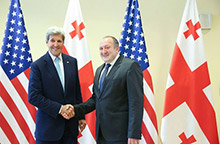 By Eugene Kogan, Tbilisi-based defence and security expert By Eugene Kogan, Tbilisi-based defence and security expert
Established in 2009, the United States-Georgia Charter on Strategic Partnership is based on four core pillars: Defense and Security Cooperation; Economic, Trade and Energy Cooperation; Strengthening Democracy; and Increasing People-to-People and Cultural Exchanges. As part of these two countries’ defence and security cooperation, the US provides financial support to the Georgian military, support for Georgia’s territorial defence and sovereignty, and, ultimately, for Georgia’s procurement of US defensive weapons. READ MORE
Key Challenges for the Armenian Foreign Policy in 2021[Over]  By Benyamin Poghosyan, PhD, Chairman, Center for Political and Economic Strategic Studies By Benyamin Poghosyan, PhD, Chairman, Center for Political and Economic Strategic Studies
2020 was disastrous for Armenian foreign policy. The defeat in the 2020 Karabakh war which resulted in the November 10 capitulation has sent shock waves across Armenia and Diaspora. Within only 44 days Armenia lost what it gained during the 1992 – 1994 first Karabakh war. Significantly reduced Nagorno Karabakh was effectively turned into a Russian protectorate and its current status can be compared with Karabakh status in 1989 when the Soviet Union put Karabakh under the direct Kremlin control through the establishment of the Special Committee led by Mr. Arkadi Volski. Now approximately 3000 square kilometres of territory with some 100,000 Armenians there is again de facto governed by the Kremlin, while the head of the Russian peacekeeping mission LtG Muradov had assumed the role of Volski. READ MORE
New Twists in Armenian-Russian Relations[Over]  By Benyamin Poghosyan, PhD, Chairman, Center for Political and Economic Strategic Studies By Benyamin Poghosyan, PhD, Chairman, Center for Political and Economic Strategic Studies
Armenia-Russia relations have been the cornerstone of Armenian foreign policy since Armenia’s independence in September 1991. Immediately after the collapse of the Soviet Union Armenia found itself in a multi-dimensional crisis – the war in Karabakh, a blockade imposed by Azerbaijan and Turkey, and steep economic decline. In those circumstances, Armenia had no alternative but to forge a strategic alliance with Russia. Thus, Yerevan signed the Collective Security Treaty in May 1992, Russian border troops were deployed along the Armenia–Turkey and Armenia–Iran borders, and in 1995 Russia took over the former Soviet military base in Gyumri. READ MORE
Political Crisis in Georgia after the Parliamentary Elections[Over] 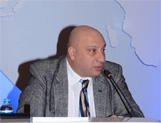 By Nika Chitadze, PhD, Professor at the International University of the Black Sea, Tbilisi By Nika Chitadze, PhD, Professor at the International University of the Black Sea, Tbilisi
As it is well known from recent media reports, a new political crisis has emerged in Georgia after the October 31, 2020 parliamentary elections. The main reason for this crisis is the fact that the opposition parties have claimed that the Central Election Commission and the ruling party “Georgian Dream” have falsified the election results and have usurped the power. The National Democratic Institute and the American Republican Institute have expressed their critical views in this regard. A relatively soft position was stated by the OSCE Office for Democracy and Human Rights and the Council of Europe.
READ MORE
Nagorno-Karabakh Becomes Russia's Latest Protectorate in the South Caucasus[Over]  By Benyamin Poghosyan, PhD, Chairman, Center for Political and Economic Strategic Studies By Benyamin Poghosyan, PhD, Chairman, Center for Political and Economic Strategic Studies
Azerbaijan, Turkey, and Russia all gained something as a result of the second Karabakh war, while Armenia and Nagorno-Karabakh lost almost everything.
The second Karabakh war ended with catastrophic results for Armenia and the Nagorno-Karabakh Republic. The trilateral statement signed by Russian, Armenian, and Azerbaijani leaders on November 10 was a clear capitulation of the Armenian sides. During the 26 long years of negotiations under the auspices of the OSCE Minsk Group, several settlement plans have been elaborated and offered to the conflict sides […]. However, none of them were as disastrous for Armenia and the Nagorno-Karabakh Republic as the trilateral statement of November 10, 2020. READ MORE
Establishing Joint Armenia–China Peacekeeping Training Center in Armenia[Over]  By Benyamin Poghosyan, PhD, Chairman, Center for Political and Economic Strategic Studies By Benyamin Poghosyan, PhD, Chairman, Center for Political and Economic Strategic Studies
Peacekeeping operations are one of the key domains of international relations. They play a paramount role in securing stability and fostering international cooperation. Currently, fourteen peacekeeping operations around the globe are led by the UN Department of Peace operations. Several other international organizations are involved in peacekeeping missions, but the UN is the ultimate authority in this sphere. READ MORE
US and Russian Involvement in Recent Domestic Upheavals in Georgia and Armenia[Over]  By Benyamin Poghosyan, PhD, Chairman, Center for Political and Economic Strategic Studies By Benyamin Poghosyan, PhD, Chairman, Center for Political and Economic Strategic Studies
After the collapse of the Soviet Union the newly independent successor states faced numerous challenges: economic collapse, ethnic conflicts, and a rapid introduction of market reforms which ushered in large scale poverty as well as a quick enrichment of very small portion of the population. At the same time, there was a constant flow of Western experts and consultants who were embedded in almost all state institutions. In the first decade of independence there was a vague but widespread perception that the ultimate destination of former Soviet republics would be membership of the Euro-Atlantic institutions - EU and NATO. READ MORE
Transformation of The Global Order: The End of Unipolarity and US - China Relations[Over]  By Benyamin Poghosyan, PhD, Chairman, Center for Political and Economic Strategic Studies By Benyamin Poghosyan, PhD, Chairman, Center for Political and Economic Strategic Studies
The COVID – 19 pandemic triggered a fierce debate among experts of international relations on the key features of the post COVID-19 world. There are several predictions and assessments – the end of globalization, the enhanced role of nation states, and a shift in global supply chains. It’s too early and difficult to assess what the world will look like decades from now, however, almost all experts have agreed on one thing; there will be no return to the 1990s and the beginning of the 2000s, when the US enjoyed absolute power and unconstrained possibilities. READ MORE
Russia and Eurasian Dilemmas[Over] 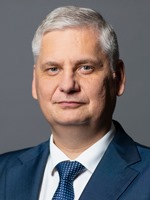 By Sergey Markedonov, Leading Researcher, MGIMO Institute
By Sergey Markedonov, Leading Researcher, MGIMO Institute
Future historians will definitely christen the year 2020 as the worldwide onset of coronavirus. It seems like tons of research articles and expert reports on the impact of the pandemic on the global economy and international political processes have been published. However, it is quite obvious that with the focus having been shifted towards the global perspective, the processes taking place in individual countries and regions appear to be falling out of sight. In the meantime, all of the conclusions drawn about the comprehensive implications of COVID-19 will remain somewhat schematic and generic without due consideration of their nuances and peculiarities. READ MORE
What’s Next in Karabakh…[Over]  By Benyamin Poghosyan, PhD, Chairman, Center for Political and Economic Strategic Studies By Benyamin Poghosyan, PhD, Chairman, Center for Political and Economic Strategic Studies
The April 21, 2020 statements of Russian foreign Minister Lavrov brought back Nagorno Karabakh issue to the forefront of expert discussions. However, Russian foreign minister did not reveal something special or unexpected. He just reiterated what pundits following the conflict settlement process had already known. Since May 2018 negotiations have been based on a phased approach. It envisaged the return of some territories to Azerbaijan and indefinite postponement of the determination of the Nagorno Karabakh final status. READ MORE
Armenia-Iran Relations: Continuity or Ambiguity?[Over]  By Benyamin Poghosyan, PhD, Chairman, Center for Political and Economic Strategic Studies By Benyamin Poghosyan, PhD, Chairman, Center for Political and Economic Strategic Studies
Relations with Iran have always been high on Armenia's foreign policy agenda. Given the closed borders with Azerbaijan and Georgia, Iran is one of only two gateways to the world for Armenia. Friendly relations with this neighboring Muslim state play a significant role in Armenian efforts to counter Azerbaijan in its attempts to depict the Karabakh conflict as a religious one and thus garner the Muslim world's support against Armenia. READ MORE
Presidential Elections in Karabakh: Background and Implications[Over]  By Benyamin Poghosyan, PhD, Chairman, Center for Political and Economic Strategic Studies By Benyamin Poghosyan, PhD, Chairman, Center for Political and Economic Strategic Studies
On March 31, 2020 presidential and parliamentary elections were held in unrecognized Nagorno Karabakh Republic. Five parties entered the Parliament, while President was elected during the second round, on April 14. The winner of the Presidential campaign was Arayik Harutyunyan, who received 49 percent of votes during the first round and 88 percent during the second round. However, his main contender Masis Mayilyan de facto boycotted second round asking his supporters not to participate in the elections due to the COVID19 outbreak. READ MORE
Coronavirus Presents Armenia with Difficult Challenges[Over]  By Benyamin Poghosyan, PhD, Chairman, Center for Political and Economic Strategic Studies By Benyamin Poghosyan, PhD, Chairman, Center for Political and Economic Strategic Studies
The COVID-19 pandemic has confronted governments with two massive simultaneous challenges. They have to contain the virus through large scale social distancing to prevent the uncontrolled growth of infected people and collapse of the health system. Meanwhile, each day that passes with economic activity virtually suspended puts an enormous pressure on businesses, and contributes to a possible social and financial collapse. Armenia faces the same dilemma. READ MORE
The Karabakh Elections Go to Second Round[Over]  By Benyamin Poghosyan, PhD, Chairman, Center for Political and Economic Strategic Studies By Benyamin Poghosyan, PhD, Chairman, Center for Political and Economic Strategic Studies
Elections were held in Nagorno-Karabakh on 31 March but since no candidate secured the necessary amount of votes a run-off is now expected between the two leading candidates in two weeks-time.
On March 31, 2020 Presidential and Parliamentary elections were held in Artsakh (Nagorno-Karabakh). Elections are not something new for Karabakh. Since the mid-1990s regular general as well as local elections have been held there. However, this time almost everything was different, such as the record number of candidates (14 running for the office of President and 10 parties and 2 blocks for Parliament) and the fully proportional electoral system. However, the key difference was the ambiguity of the position of Republic of Armenia's leadership. READ MORE
Special but Not Quite Strategic[Over]  By Benyamin Poghosyan, PhD, Chairman, Center for Political and Economic Strategic Studies By Benyamin Poghosyan, PhD, Chairman, Center for Political and Economic Strategic Studies
Two key topics concerning Georgia dominated the attention of the international media and expert community interested in the South Caucasus in past week. One was the outbreak of the novel Coronavirus and the growing number of cases identified in Georgia; the second issue was connected with domestic politics.[…] However, from regional perspective the key event of the past week was the official visit of Armenian Prime Minister Nikol Pashinyan to Georgia on March 3 - 4. READ MORE
Rivals in the Midst of Domestic Transformations[Over]  By Benyamin Poghosyan, PhD, Chairman, Center for Political and Economic Strategic Studies By Benyamin Poghosyan, PhD, Chairman, Center for Political and Economic Strategic Studies
On February 9, 2020 early parliamentary elections were held in Azerbaijan. According to preliminary results the ruling "New Azerbaijan" party has won a clear majority, while, some representatives of opposition, such as Erkin Gadirli from REAL, have entered the Parliament. However, the main speculation around the elections was not the name of the winner; few if any had expectations that ruling party may lose the elections, or that the process will be in full compliance with liberal democracy requirements. The key question is on the implications of these elections for the domestic balance of power in Azerbaijan, and the future development of the country. READ MORE
- February 25, 2020 21:11PM
Rivals in the Midst of Domestic Transformations[Over]  By Benyamin Poghosyan, PhD, Chairman, Center for Political and Economic Strategic Studies By Benyamin Poghosyan, PhD, Chairman, Center for Political and Economic Strategic Studies
On February 9, 2020 early parliamentary elections were held in Azerbaijan. According to preliminary results the ruling "New Azerbaijan" party has won a clear majority, while, some representatives of opposition, such as Erkin Gadirli from REAL, have entered the Parliament. However, the main speculation around the elections was not the name of the winner; few if any had expectations that ruling party may lose the elections, or that the process will be in full compliance with liberal democracy requirements. The key question is on the implications of these elections for the domestic balance of power in Azerbaijan, and the future development of the country. READ MORE
- February 17, 2020 23:16PM
The Perspectives of Russia–Iran Relations in the Context of the Recent US–Iran Escalation[Over]  By Benyamin Poghosyan, PhD, Chairman, Center for Political and Economic Strategic Studies By Benyamin Poghosyan, PhD, Chairman, Center for Political and Economic Strategic Studies
The recent US – Iran escalation is the hot topic for the Middle East pundits. Many policy briefs have already been published discussing the motives behind the US and Iran actions, the implications of these developments on the US Presidential campaign and Iranian Parliamentary elections. Many experts are seeking to assess the future of the US – Iran relations and the Iran’s influence in the region. Meanwhile, US – Iran tensions which fell short of a full blown war will have an impact also on Russia – Iran relations and in particular on their uneasy partnership in Syria. READ MORE
The Uncertain Future of EU Enlargement: Implications for the South Caucasus[Over]  By Benyamin Poghosyan, PhD, Executive Director, Political Science Association of Armenia By Benyamin Poghosyan, PhD, Executive Director, Political Science Association of Armenia
In 2019, the EU and six Partner states are celebrating the 10th anniversary of the Eastern Partnership (EaP) program. Many conferences, expert workshops and other events were organized to assess the success and failures of the EaP. Meanwhile, alongside assessments of the past, the future of the program is also being actively discussed. EU even launched the ‘Structured Consultation” on the future strategic direction of the EaP and tasked the European Commission and the European External Action Service to present proposals. Member States and Eastern Partners, as well as other actors, including civil society, academia and think-tanks were invited to share their views on a new post-2020 policy framework, and the perspectives of EU enlargement. READ MORE
- December 24, 2019 21:46PM
Turkey-NATO Relations: Strained and Constrained[Over] 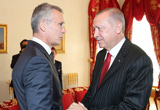 By Armine Arzumanyan, Graduate of Renmin University, PR of China By Armine Arzumanyan, Graduate of Renmin University, PR of China
China's main goals in Central Asia may not directly hint at the region's long-term strategic importance, but the outcomes of China's engagement in the region clearly show concrete signs of it. China's emergence as the dominant actor in the region’s energy and infrastructure sectors, along with its growing presence as the lender of choice for Central Asia, has had deep consequences as Beijing has quietly cultivated the defense component of its newfound presence in region. Though relatively little studied, China's energy-infrastructure-defense tridimensional approach is of immense importance. READ MORE.
- November 20, 2019 07:00AM
China's Underestimated Strategic Engagement in Central Asia[Over]  By Armine Arzumanyan, Graduate of Renmin University, PR of China By Armine Arzumanyan, Graduate of Renmin University, PR of China
China's main goals in Central Asia may not directly hint at the region's long-term strategic importance, but the outcomes of China's engagement in the region clearly show concrete signs of it. China's emergence as the dominant actor in the region’s energy and infrastructure sectors, along with its growing presence as the lender of choice for Central Asia, has had deep consequences as Beijing has quietly cultivated the defense component of its newfound presence in region. Though relatively little studied, China's energy-infrastructure-defense tridimensional approach is of immense importance. READ MORE.
- November 20, 2019 07:00AM
Russia, China and the West. And Armenia in the Middle[Over]  By Benyamin Poghosyan, PhD, Executive Director, Political Science Association of Armenia By Benyamin Poghosyan, PhD, Executive Director, Political Science Association of Armenia
Prospects of Russia - China relations are currently hotly debated by international security pundits. The West in general, and the US in particular, see these two states as key adversaries seeking to undermine the international world order. Simultaneously, the prevailing mood among Western expert and academic circles is confident that, at the end of the day, China is a more significant challenge to Russia than it is to the West, given the vast and scarcely populated areas of Siberia and the Russian Far East bordering China. READ MORE
- November 20, 2019 06:50AM
Armenia-Azerbaijan: Searching for New Models of Dialogue[Over] 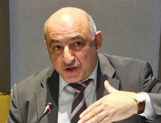 Joint Study with “Yeni nesil”, coordinated by Boris Navasardian, President, Yerevan Press Club Joint Study with “Yeni nesil”, coordinated by Boris Navasardian, President, Yerevan Press Club
The main purpose of this study was to consider the feasibility and prospects of revival of the Track-2 diplomacy and the development of appropriate recommendations. Although it was conceived and supported by the US government even before the political changes in Armenia, its relevance was confirmed by the intensification of the dialogue at the official level between Yerevan and Baku in the summer of 2018. Certain characteristics of the renewed interest in the informal communication were revealed during the visit to Yerevan of the Azerbaijani journalist Shahin Hajiyev, in February 2019, and by the interest of Armenian journalists to visit the neighboring country. READ MORE
|
|